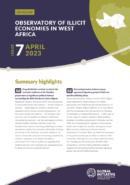Posted on 20 Dec 2012
Drug trafficking is no longer considered solely a social ill or a domestic issue, but is now presented as a matter of European security (1). In the European Union (EU) vast amounts of resources are spent on securing external and internal borders against illegal drugs and punishing those who break drug laws (2); however, research in the area is still, comparatively, in its infancy. Very little is known about the operation of drug markets or about state and non-state responses to drug markets and the effects of these. There remains a disconnect between theoretical models and regular data gathering that empirical research has so far been unable to bridge. Thus, the aim of this project was to reassess the ontological assumptions that have been underpinning drug market research and informing research choices to determine whether a more comprehensive and comparative approach might be more useful in the future. Until very recently the collection and analysis of drug-related law enforcement data at the national, European and global levels, and the subsequent evaluation of law enforcement policy, was largely in the hands of law enforcement agencies rather than a subject of wider public analysis and debate. The accepted models of drug markets and interventions have been a product of combining
these data with the findings of small-scale, local and ethnographic studies. These models have not been rigorously tested, as evidenced by the lack of subsequent data. The limitations of current data, in terms of availability, methodology, reliability and comparability, are well known to researchers in the field (EMCDDA, 2002; Dorn et al., 2005, p. 2).



